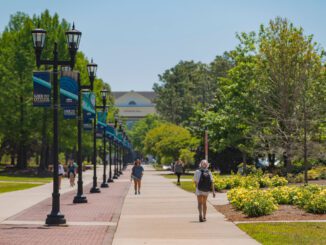
It was a brutally hot day in late July 1987 when I left home in Elizabethtown for the lonely drive to college. I remember it vividly because the air conditioner did not work very well in the beat-up used Honda Accord I had just purchased from money earned mowing grass that summer after high school graduation.
I hugged my folks, said goodbye, and after seven hours with the cassette tape blaring a mix of U2, Jimmy Buffett and local radio stations, I finally arrived in eastern Tennessee late in the afternoon to start my adulthood journey.
I was 17 years old that day and the school did not have an “orientation.” You simply showed up before classes began, bought your books and moved into the residence hall they assigned. I guess they took the position that, whatever else you needed to know, you would figure out.
Orientations are now required for all new college students — with parents hovering like low-flying helicopters. New students are a captive audience at these two-day events that educate them on student organizations, where to eat, Title IV and how to get basketball tickets.
The schools pass out printed programs with platitudes printed on glossy-papered pages that say things like “we respect diversity” and “we are an inclusive campus.” But, other than the value of gender and race diversity, colleges rarely emphasize the importance of thought and viewpoint diversity.
This is a missed opportunity for our universities.
There is no better time than at the beginning of their “higher education” experience to show students that not everyone agrees with them or shares their worldview. People come to college with different opinions, priorities and goals.
Free expression of ideas at campus events and in classrooms used to be an absolute. Yet we now see events canceled, speakers and faculty members shouted down and nearly assaulted for doing nothing more than offering viewpoints with which some loud, vocal campus members disagree.
It gets worse.
In some classrooms, students who fear a bad grade from an ideological professor engage in self-censorship to avoid scrutiny from authority’s jaundiced eye when anything but the preapproved narrative. Some fear physical reprisals from their fellow students or ostracization from campus organizations.
A 2021 survey by the Foundation for Individual Rights in Education (FIRE) canvassed more than 37,000 students on 159 college campuses across the nation and found that 23% of these college students believed violent behavior was warranted against people who said things with which they disagreed.
Think about that for just a second.
Nearly 1 in 4 college students feel it is legitimate to resort to violence against someone solely based on a stated opinion. Imagine if 23% of college students were driving drunk on any given day. Or 23% of them were skipping class. Or committing sexual assaults. Or cheating on their exams.
Would we try and do something?
All campuses should use the early opportunity available at First Day Orientation to start inculcating into the new arrivals that most sacred of traditions at “institutions of higher learning” — respect for thought diversity, and this commitment should be carried through each year, and at each stage of the student’s campus life.
It is not enough to just put the politically correct words in a brightly colored brochure and sit a stack of them on the welcome table. More must be done to invite, value, protect and celebrate thought diversity or irreparable damage will result to our next generation of leaders and problem solvers.
I talk to a lot of people that think the genie is already out of the bottle, the damage has already been done and that it is too late to restore equilibrium to college campuses.
I disagree.
Our country has been through a few other times when shouting and screaming — sometimes shooting and killing — substituted for democratic dispute resolution, yet we survived because, eventually, words and thoughts became the survival ropes that pulled us out of the abyss.
Looking back on that hot July day many years ago, I do not recall where I laid my head on that first night in the dorm, but I still remember, like it was yesterday, the excitement and promise that swirled as I anticipated all that waited for me that next morning and beyond.
Let’s use that same moment that occurs every year on our campuses to show these young vibrant minds how enthralling it can be to learn things from someone with whom you might otherwise disagree.
Perhaps, some good could come from an initiative like this.
Woody White is a resident of New Hanover County.


